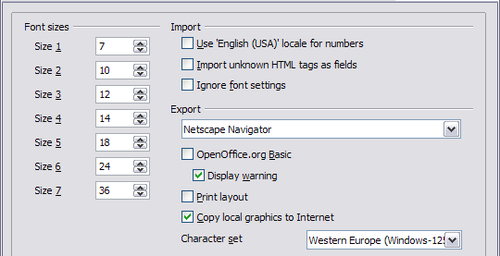HTML compatibility Load/Save options
Choices made on the Load/Save - HTML Compatibility dialog affect HTML pages imported into OpenOffice.org and those exported from OOo. See HTML documents; importing/exporting in the Help for more information.
Font sizes
Use these fields to define the respective font sizes for the HTML <font size=1> to <font size=7> tags, if they are used in the HTML pages. (Many pages no longer use these tags.)
Import - Use 'English (USA)' locale for numbers
When importing numbers from an HTML page, the decimal and thousands separator characters differ according to the locale of the HTML page. The clipboard, however, contains no information about the locale. If this option is not selected, numbers will be interpreted according to the Language - Locale setting in Tools > Options > Language Settings > Languages. If this option is selected, numbers will be interpreted as for the English (USA) locale.
Import - Import unknown HTML tags as fields
Select this checkbox if you want tags that are not recognized by OOo to be imported as fields. For an opening tag, an HTML_ON field will be created with the value of the tag name. For a closing tag, an HTML_OFF will be created. These fields will be converted to tags in the HTML export.
Import - Ignore font settings
Select this checkbox to have OOo ignore all font settings when importing. The fonts that were defined in the HTML Page Style will be used.
Export
To optimize the HTML export, select a browser or HTML standard from the Export box. If OpenOffice.org Writer is selected, specific OpenOffice.org Writer instructions are exported.
Export - OpenOffice.org Basic
Select this checkbox to include OOo Basic macros (scripts) when exporting to HTML format. You must activate this option before you create the OpenOffice.org Basic macro; otherwise the script will not be inserted. OpenOffice.org Basic macros must be located in the header of the HTML document. Once you have created the macro in the OpenOffice.org Basic IDE, it appears in the source text of the HTML document in the header.
If you want the macro to run automatically when the HTML document is opened, choose Tools > Customize > Events. See Chapter 17 (Getting Started with Macros) for more information.
Export - Display warning
When the OpenOffice.org Basic checkbox (see above) is not selected, the Display warning checkbox becomes available. If the Display warning checkbox is selected, then when exporting to HTML a warning is shown that OpenOffice.org Basic macros will be lost.
Export - Print layout
Select this checkbox to export the print layout of the current document as well. It can be read by OpenOffice.org and by Netscape Navigator and Microsoft Internet Explorer 4.0 and above.
The HTML filter supports CSS2 (Cascading Style Sheets Level 2) for printing documents. These capabilities are only effective if print layout export is activated.
Export - Copy local graphics to Internet
Select this checkbox to automatically upload the embedded pictures to the Internet server when uploading using FTP.
Export - Character set
Select the appropriate character set for the export.
| Content on this page is licensed under the Creative Common Attribution 3.0 license (CC-BY). |
